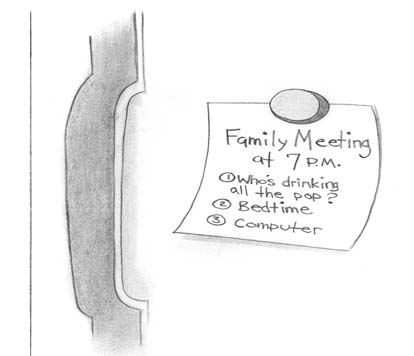The 1-2-3 Magic Workbook for Christian Parents: Effective Discipline for Children 2-12 (30 page)
Read The 1-2-3 Magic Workbook for Christian Parents: Effective Discipline for Children 2-12 Online
Authors: Thomas W. Phelan,Chris Webb
Tags: #Family & Relationships, #Parenting, #General

second time!
Key Concepts...
If ever there were a time when the
No-Talking and
No-Emotion Rules
are important, it’s in the middle of the night!

19
The Family Meeting
Democracy in action—almost
When your children are small, you, the parent, should be the
boss at home. Your parenting should be a kind of benevolent dicta-
torship, where you make most of the decisions, you are the judge and jury,
and you are gentle and kind. Your children will not decide each day what
they have for dinner, when they go to bed or whether or not they show up
for preschool in the morning. The reason for this benevolent dictatorship
arrangement is that you know better than your small kids what is good
for them, and you have a right—and a duty—to impose your wishes on
the youngsters—even if they don’t like it sometimes.
Obviously, counting is a tactic that doesn’t give the kids much
say in the discipline. That’s the way it should be for the welfare of the
children as well as the parents. You decide what is Stop behavior and
you punish it with a brief time out, but you do so in a way that is fair,
calm and not emotionally or physically abusive. Charting and other Start
behavior tactics are often friendlier than counting, but these strategies
are still largely designed and applied by the grownups in the house.
As your little ones get bigger, however, the deal should gradually
change. When your children are seventeen, the household should be
167
168 1-2-3 MAGIC
almost, but not quite, a democracy. Almost a democracy means that these
adolescents have a lot more to say about the rules and policies that affect
them. This notion also means that as the years have gone by you have been
giving your kids more and more independence. Ideally, teens should be
making their own decisions about homework, bedtime, choice of friends,
clothes and—to a large extent—diet. Gradually encouraging children’s
growing autonomy is one of a parent’s most important challenges.
How do you go about supporting your kids’ independence and
letting them make more of their own decisions and more of their own
mistakes? As we’ll see a little later, avoiding what I call overparenting is
one critical factor. Another way to foster your children’s growing right
to self-determination is the family meeting.
The Board of Directors
The family meeting is just what the name implies. Everyone in the family
sits down together and, in an organized fashion, discusses some of the
problems they have living together. Some parents use family meeting
time to exchange positive feedback as well. A good time to start family
meetings is when the kids are in the primary grades in school. Don’t try
family meetings when the children are three or four years old; that’s a
good way to go insane inside of twenty-five minutes.
There are several reasons why the family meeting is a good idea. As
the kids get older—and hopefully more rational—it is more appropriate
that they have a bigger voice regarding the issues that affect them, such
as chores, phone use, vacations, allowances and discipline. In addition,
kids will often cooperate better with a decision or policy when they have
had a say in the development of that idea. And finally, children need the
experience of family negotiation for the later time in their lives when they
have their own marriages and families. Unfortunately, far too many mar-
ried adults learn the hard way—when it is too late—that their negotiation
skills stink.
So the family meeting is a good way to start giving the kids more of
a voice in household operations. You can use this domestic get-together to
discuss such communal issues as laundry, allowances, bedtimes, renting
movies, vacations, food, sibling rivalry, etc. The list of potential topics
THE FAMILY MEETING 169
is a long one. Though the meetings will be more democratic, mom and
dad will still have the final say if there is an unresolvable difference of
opinion. Naturally you—and everyone else—will be doing more talking,
but primarily at the meeting itself. The No-Talking rule will still apply
when a policy is being enforced.
The family meeting can take place as often as you wish; once every
week or two is ideal. You can also call special meetings whenever a
unique or urgent problem comes up. And—believe it or not—your kids
can request a meeting themselves.
How to Run the Family Meeting
The format of the family meeting is very simple and the guidelines I’ll
present here are only one of many possible ways you can conduct yours.
Mom or dad (not both at the same time) is usually the chairperson and
has the responsibility for keeping order and for keeping people on task.
Older children can take a try at running the meeting themselves from time
to time if you think they can handle the job well enough. The chairperson
sees to it that the agenda is followed and that each person gets a chance
to speak without being interrupted.
What is the agenda? It’s very simple. Each person in the family brings
to the meeting a problem that he or she wants resolved. Then, with each
issue, the chairperson guides the group through the following steps:
1. One person describes the problem she wants resolved.
2. Every other person gives his or her thoughts and feelings
about that problem.
3. The floor is opened to proposals for solutions; anyone
can speak, but one at a time.
4. A solution to be tried is agreed upon. This final idea may combine
aspects of the suggestions from different people. If there are
disagreements, mom and dad have the final say.
5. The agreed-upon solution is written down on a piece of paper
that is then posted on the refrigerator. Or the solution can be
written in a Family Meeting Journal, notebook or computer.
6. The next person brings up his problem, and steps 2-5 are
repeated.
170 1-2-3 MAGIC
Most solutions are considered experimental in the beginning, espe-
cially if the plan is complex and differences of opinion about it are large.
If the proposed resolution doesn’t work too well, that idea can always
be reviewed at the next family meeting. Although proposals should be
concrete, specific and practical, don’t be afraid to make them flexible and
imaginative! (See our “Who’s drinking all the pop?” example later in this
chapter.)
Sitting through these family meetings is not easy. If you’re hoping
these will be warm, fuzzy experiences, they’re not. In fact, family meet-
ings can be downright obnoxious at times, so it’s a good idea to keep
them under an hour so you don’t go crazy. Before our family meetings,
our kids would grumble and tell us that all their friends thought my wife
and I were weird. But once at the meeting, our two youngsters would
certainly put in their two cents worth!
Many parents agree that the family meeting is, paradoxically,
one of
the most aggravating and one of the most effective
things
you can do with your children. If you can get through the process, people in the family do
have a greater tendency to follow through with the agreed-upon solutions.
It’s also nice that everyone has a chance to speak out and to learn some
negotiation skills.
Problems and Solutions: Two Examples
1. The Case of the Disappearing Soda
When she was nine, my daughter brought this weighty issue to our biweekly
family meeting. The girl explained that Mom or Dad usually bought an
eight-pack of soda pop, and there were four people in the family. The
problem was that she wasn’t getting her two bottles. There was never any
left! We all listened to our daughter’s description of the problem, then
brother, Mom and Dad all threw in their opinions.
After some jockeying around we found a solution. When the eight-
pack of pop entered the house, all eight bottles would be initialed with
a felt marker: two for Mom, two for Dad, two for Sister and two for
Brother. If you drank your two bottles, you were done having pop until
the next eight-pack arrived. If you still wanted more pop at some time

THE FAMILY MEETING 171
after you had consumed your own two bottles, you followed a specific
procedure. First, you had to check the eight-pack to see if there were any
full bottles left and, if there were, whose initials were on the bottles. If
there was a full one, you could purchase it for fifty cents from the person
who “owned” it. If the person declined to sell, however, no testing and
manipulation was allowed.
This agreement was posted on the refrigerator and it worked like a
charm.
2. The Unbelievable Case of the Summer Bedtimes
My son brought this issue to one of our family meetings when he was about
eleven. Apparently he and his sister had conspired before the meeting to
suggest that summer bedtime should be different from bedtime during
the school year. In fact, the kids didn’t think they should have a specific
bedtime at all during the summer, since they could sleep the next day.
The unbelievable part of this case is that my wife and I agreed to the
kids’ proposal! Although this idea made us somewhat uneasy, we agreed
to try the plan on one condition: If we parents went to bed before the kids
did, the kids would have to be amazingly quiet and could not wake us up.
Otherwise the deal would be changed.
After a few nights of trial and error, the deal was changed at another
meeting because the kids were waking us up. The new deal, which worked
well, was this: If the kids woke us up, they had to go to bed immediately.
Points to Remember...
Family meetings are effective
and
obnoxious. You will get
a lot accomplished and teach your kids some valuable
negotiating skills. But you’ll also have to put up with a fair
amount of aggravation when people interrupt one another or argue.
Keep the meetings under one hour, be as patient as you can, and
don’t ever expect anyone to want to come!

20
When Do You Talk?
Effective behavior is the result of insight—plus practice.
The No-Talking and No-Emotion rules do not mean that you never
should talk to your kids about their troublesome behavior. But there